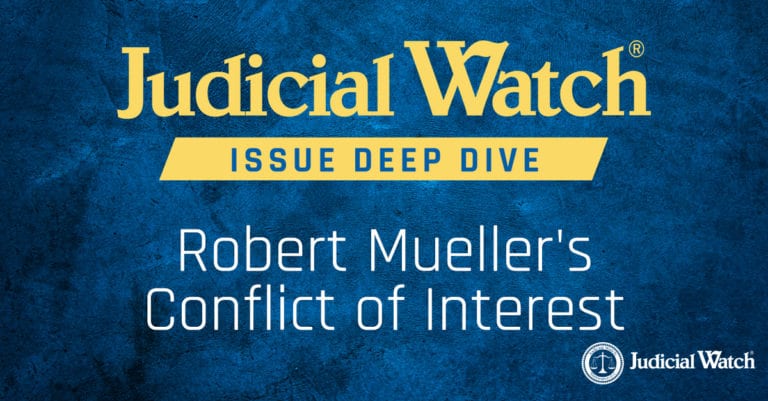

Robert Mueller’s Conflict of Interest


“This is an extraordinary document in the sense that it ought to generate a criminal investigation into Mueller’s testimony,” Fitton stated in last week’s Weekly Update.
Ongoing Judicial Watch investigations have uncovered documents that appear to contradict – in Fitton’s words – FBI Special Counsel Robert Mueller’s previous statements about his potential bid for the position of FBI Director. Appearing to conflict with this statement made before the House Judiciary Committee on July 24, 2019, Fitton states that “emails from Rod Rosenstein show that Mueller pulled himself out of the running for FBI Director on the very day he was pulled for special counsel. The email suggests that Mueller communicated directly with Rosenstein and withdrew his name from the job.”
As Fitton explains, these findings came as part of a Judicial Watch lawsuit investigating the “seven days in May [2017],” the period in which president Trump “fired” then-FBI Director James Comey. Judicial Watch has narrowed in on the activities of Comey’s successor, “his buddy, McCabe who was acting director of the FBI… and Rod Rosenstein [who both] were thinking of ways to overthrow president Trump.” In an apparent attempt to keep their conversations secret, McCabe told Mueller that the boss “doesn’t know we’re talking” – revealing McCabe’s close interaction with Mueller during the hiring process, a detail he seemingly wanted to keep hidden from “the boss” – which Fitton believes is in reference to president Trump. “The point was that he was secretly talking to Mueller while he was also considering him for the FBI Director position.”
The congressional hearing focused on Mueller’s conversations with the president, with whom he allegedly did not discuss his running for FBI Director. Rather, Mueller states that he discussed “what sort of person should be in the FBI job” – a strange, and potentially untrue recounting of the events according to Fitton.
“It shows that the Mueller operation was conceived in sin in the sense that there was an inherent conflict of interest Mueller had. He was investigating how allegedly Comey’s firing was an obstruction of justice. How could he investigate that issue if he interviewed for the very job. He would be a witness.”
“He was looking to get the job and he did have a conflict of interest,” Fitton noted.
If you’re concerned about Mueller’s conflicts of interest, and government corruption at large, support Judicial Watch today. It’s the best way to ensure your concerns are heard in court, and in the public square.















